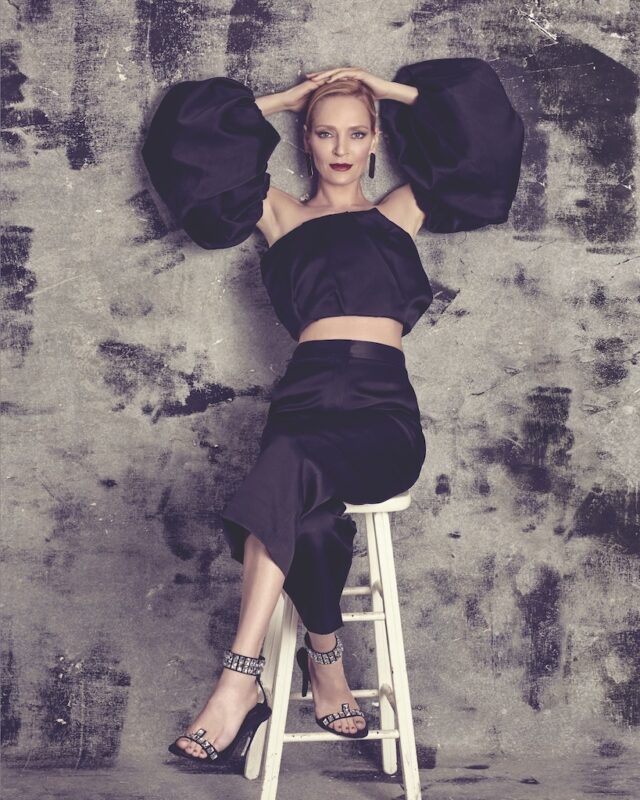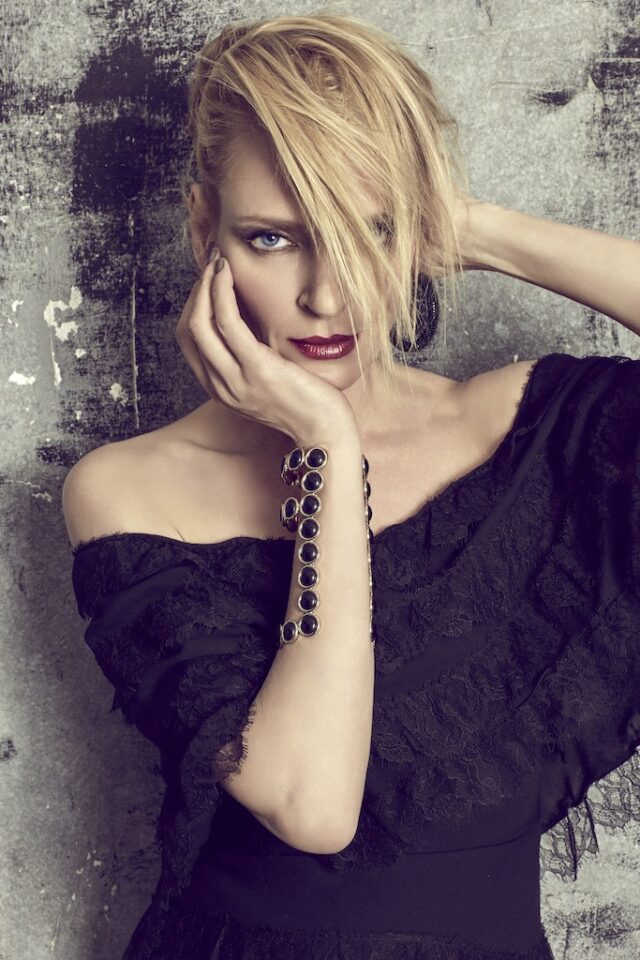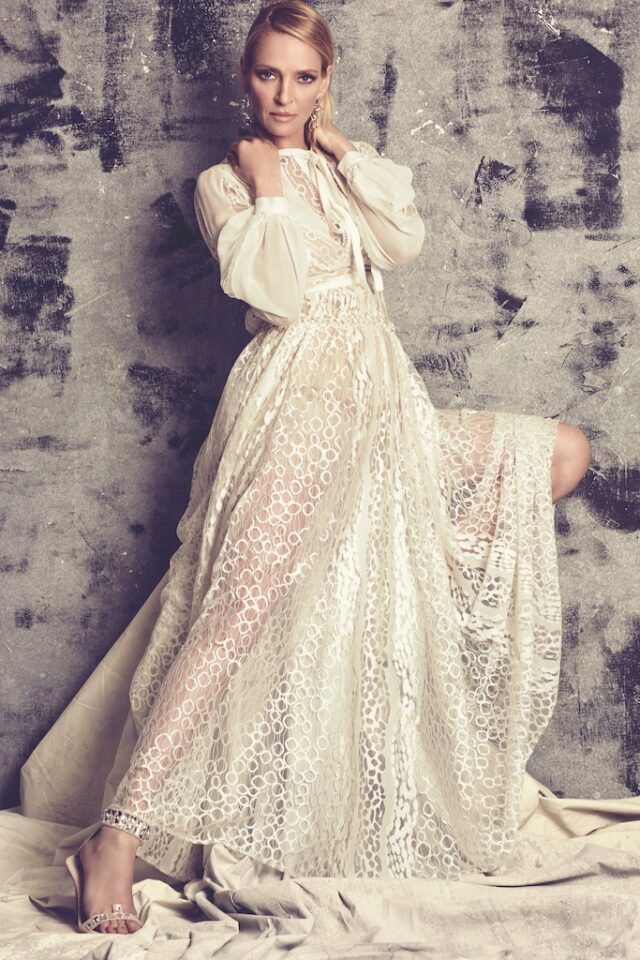
By Cristina Cuomo
With family always her focus first, acclaimed, gutsy actress Uma Thurman has emerged from a hiatus with newfound appreciation for collaboration and creativity. In her 38-year career, she’s always tackled a wide range of genres in theater, television and film classics as diverse as Dangerous Liaisons, Pulp Fiction and the two-volume Kill Bill. Her new projects include The Old Guard 2 on Netflix, in which she plays the villain Discord—who goes toe-to-toe with co-star Charlize Theron—and a recurring role as head of security on Dexter: Resurrection. A champion of family health and environmental causes, she narrated The Future of Nature, a recent four-part PBS series. This year marks over two decades as an ambassador and founding board member of Room to Grow, a nonprofit for young families that hosts a gala benefit at the Ziegfeld Ballroom on October 21 in New York City.
PURIST: Let’s talk about your new Netflix film, The Old Guard 2. I know it’s an action thriller, very demanding, requiring a lot of physical and mental preparation. What was that training like, and how did you maintain your well-being?
UMA THURMAN: The truth is, because I joined The Old Guard 2 very late in the game of production, right before production started, I had zero time to train, and that was one of the enormous challenges of doing it. And it was being shot during the tail end of the weird—let’s not even use the C word—C-O-V-I-D. It was during that era when filming was really tricky. So, I had no time to train, and if I do an action movie again, I will definitely make time for that. Yeah, me and my yoga-Pilates self just sort of jumped into that movie at the last minute trying to call upon my very old memories of swordplay.
Such a dynamic team, you and Charlize Theron.
The first Old Guard is really good. Watching it, I just thought, Charlize is so bold, so courageous and extraordinary. In the first Old Guard, she took it upon herself to push the boundaries of women in action. The first Old Guard hit a tone and a feeling for me, where I might have been watching a drama with depth that also had a kind of thrilling, extraordinarily high action to it. I know that’s what she was trying to protect and nurture in The Old Guard 2. It was exciting to watch her in the first The Old Guard, and that’s what made me take my unprepared yoga-Pilates body and join her.
You’re the original woman in action. What was it like playing the first immortal, the oldest person in the world?
That’s the only thing I really did train for. I was one of those children who felt ancient from a very young age. Playing someone who is the common cliche of “seen it all”—what if you’d actually really been there and seen it all? And working through the complicated emotions you would have about the journey of the last couple thousand years of civilization? That was a fun mental exercise.
With roles like that, you’re living in such high intensity. How do you return to your center?
It’s very simple—my routines, my family. My center is my family, and basically my favorite thing to do. Home and nature and wellness. Being in the body.

Speaking of wellness, how has your approach shifted over the course of your career? What feels most important to you now?
From the physical to the spiritual, contributions all have to come from a place of health and wellness, which maybe you take for granted when you’re younger. Over time, I learned that pushing yourself to the limit, close to burnout, really loses its charm. As much as I want to stay challenged, and I believe in boldness, I learned not to take well-being for granted. It’s a wise move as you mature. Wellness is the most important thing to me, and not out of a desire to indulge myself, but out of having learned that it’s only through self-care that you can actually really, truly be of service to others.
What’s a habit that you utilize to protect your energy? Do you meditate? You said you do Pilates and yoga.
I hated yoga when I was younger. It was too much in my head. But I’m sort of obsessed with yoga now, which might be from having found the right teacher, Linda Winnick. Pilates and yoga are different tools, really, but it’s neuromuscular physical centering, aside from strengthening and staying flexible and fluid. I wish I could say I meditate, but I don’t, really. At the end of the day, it’s the same old stuff we always knew. Exercise, diet and then some awareness to protect your inner peace.
What advice would you give to your younger self, when you were just starting out?
Stress doesn’t really enhance performance. There is a certain amount of healthy stress that comes from caring about results, but I really think that allowing negative stress to be too consuming is extremely destructive.
Tell me about Dexter: Resurrection. You’re filming the next season right now?
Love Dexter: Resurrection. We’re finishing the season, and it’s been just one of the most positive experiences ever. The cast, the crew, just the production from top to bottom—it’s a very healthy set with really professional and positive people. This season is really well written, and I think that’s why it attracted such a wonderful cast, starring Michael C. Hall as well as Peter Dinklage, Neil Patrick Harris, Krysten Ritter and Eric Stonestreet. I play Peter’s henchwoman. On the first day we worked together, Peter started talking, and I was so spellbound that I actually blew the first take by forgetting to say my line as he was doing his speech. He’s even more riveting to watch in person—his use of language and the ideas that come through the way he works the material. I’d love to see him on stage, which I never have. He’s just unbelievable. And Michael C. Hall is so extraordinary in his portrayal of Dexter. He’s also a great leading man, and a terribly nice person. That’s really lucky.
What are the things that you look for in a project? Is it good writing, the cast, the director?
It’s always the writing. I have tried projects where there are issues with the writing, but other elements are very strong. You can’t get around it. Writing is the cornerstone. Maybe in some type of performance art piece it might be different. In what I do, it’s always the writing, the director, the other performers, and then the part.

You’ve done so much in your career—action, thrillers and comedies. You’ve done a lot of theater. I saw The Parisian Woman on Broadway, which was amazing. Is there something you haven’t done that you’d like to do?
I think I have successfully hit every single genre because I’m so wackadoodle in my diversity. My enthusiasm for all forms of entertainment probably radiates through my really diverse choices. I love comedy, and I am actively hoping to find what would be the next play. I’ve had many meetings with different directors, and we’ll see what happens. The last couple of projects, I really had fun. Having been very home-centered for a zillion reasons, getting back to work and having a more active work life is just giving me so much joy. I kind of forgot how much it tuned me up as a being. I love my family. I’ve loved raising children. It’s been great, but reactivating my creativity and just being around people doing a project together and working toward a common goal, it’s very special, like a drug, a happy drug. I worked with a wonderful female director, Vicky Jewson, in Hungary in the fall on a film that’s got action in it. It’s called Ballerina Overdrive, and I played an Eastern European thug, which was amusing. It was also a positive experience. Sets can be very happy places to be, and I’ve been finding that it’s been very satisfying to be back.
I love to hear that. I’ve had the good fortune of being front row to your amazing talent as a mother, coming to see you and your three children. Now your son, Levon, and daughter Maya have both become actors, following in your footsteps. Maybe you’ll do something with them.
I have to say, the greatest feeling in the world is to see your children thrive, and now the older ones are adults, and they’re thriving. There’s no greater reward in life than that.
How is your lovely youngest daughter, Luna, doing?
My lovely Luna is a superstar. My lovely Luna is the apple of my eye. She truly is. She’s the center of my world. She’s just the greatest.
For well over 20 years now, you’ve been involved with the nonprofit Room to Grow, trying to help other families get an equal chance to set their children on a positive and healthy path in life.
Since 1998, when Maya was born. I never gave up on it. I do think there is so much need, and I think it’s an incredible way for families now to help other families in their own communities.
I love that they support families with newborns to toddlers. Those formative years are the most critical. When you can have a good start in life like that, it makes all the difference to the future of the child.
The research does show that the achievement disparity begins from birth, so it is a time that you want to make sure that a family has what it needs to nurture their children emotionally, physically and spiritually.
You’re involved in the PBS docuseries The Future of Nature, and talk about micro-change environmentalism and all the things we can do to make a difference. What’s the message you hope people take away from it?
How nature can heal, and the myriad ways in which we can stop interfering with nature’s ability to actually save and help us. We are interdependent with nature. I think a lot of the noise that some people shut down around is the idea of protecting nature, but not caring about people. It’s just nonsense, because we live on this planet and we’re entirely dependent on it. The 1 to 10 centimeters of topsoil that covers this Earth is our entire life force. Isn’t it incredible, when you think about how thin topsoil is, and that without it life would cease? The documentary lays out so much knowledge and influence about how nature works, and how we can work with nature, and how every small contribution matters, even down to a rooftop garden for a pollinator.
When I talk about micro-change, I don’t mean to sound trivial, I’m just trying to be real. People can only shift at the rate that they can, and each person has a different set of circumstances. Every time you make a New Year’s resolution that you’ll be going to the gym five times a week, what happens? Nothing. But if you put your arms around yourself and say let’s go for a walk on Tuesday, you start somewhere and develop. And so, just trying to meet people where they are takes the terror out of it. To know that all growth happens incrementally. We’re all complicated beings, and we grow and change, sometimes slower than we want. It’s still worth doing. It’s worth taking care of how you live on the planet.
Room to Grow annual gala, October 21, Ziegfeld Ballroom, NYC, roomtogrow.org/gala





